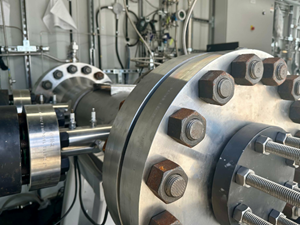News
Ekona Power pilots methane pyrolysis solution for low-cost clean H2
Ekona Power announced its xCaliber methane pyrolysis reactor has met 2023 performance targets. Ekona has been testing the reactor at its Burnaby facility for the last several months, producing H2, measuring reactor performance, and evaluating solid carbon generated from the methane pyrolysis process. Having achieved this internal performance milestone, Ekona will expand its Burnaby test platform to demonstrate an integrated 200 kg H2/d pilot plant in 2024.
“This is a terrific achievement for our team, including the investors and funding partners who have supported our work to date,” said Chris Reid, Ekona’s CEO. “Our reactor testing met targets for H2 yield, moving Ekona’s technology another step closer to commercial readiness.”
Ekona is using an established process (methane pyrolysis) in a groundbreaking new way. Ekona’s novel reactor design uses pulsed combustion and high-speed gas dynamics to split natural gas into clean H2 and solid carbon, delivering a solution that can be deployed wherever there’s natural gas infrastructure, literally bringing carbon and greenhouse gas management back down to earth.
Ekona first demonstrated its methane pyrolysis reactor concept in 2020. The company scaled up the reactor design in 2022 to deliver an output capacity of 200 kg H2/d and support system development. In 2023, Ekona integrated this reactor with key balance-of-plant equipment to evaluate performance and integration.
“Decarbonizing hard-to-abate sectors is a global priority for meeting net-zero targets and demand for clean energy. But in many sectors, electrification just isn’t possible,” continues Reid. “What we’ve developed is a low-cost, flexible solution for scaling clean H2 production and accelerating greenhouse gas emissions reductions in these challenging sectors—all without the need for water, renewable electricity, or CO2-sequestration infrastructure.”
Building upon its Burnaby pilot system, Ekona plans to deploy a 1 tpd clean H2 production plant with an industrial partner in 2024, with commissioning and operational testing in 2025. First commercial deployments are slated for 2026.


